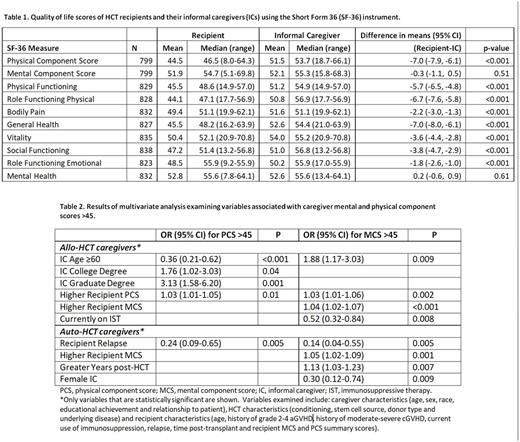Abstract
Introduction
Autologous (auto) and allogeneic (allo) hematopoietic cell transplant (HCT) recipients face a prolonged post-HCT recovery. Given the extent of supportive care needed post-HCT, recipients are required to have an informal caregiver (IC). ICs are typically spouses, siblings, children or parents of recipients. ICs are critical to post-HCT care, providing emotional support, medication management, assistance with activities of daily living and other vital care that spans months to years of recipient recovery. Given the commitment and responsibility that caregiving requires, it follows that ICs may be burdened. To date, small studies have found that HCT ICs may experience significant levels of distress and burden, as well as poor quality of life (QoL) after HCT. Here we report a large cross-sectional evaluation of HCT IC QoL.
Methods
From July 2015-June 2016, a survey for ICs was included with a yearly QoL survey that is sent to HCT recipients. Recipients were to give the IC survey to the appropriate person. Both recipient and IC surveys included the SF-36 QoL instrument. SF-36 scores were standardized to the general population (mean 50, standard deviation of 10). Multivariate analyses using forward stepwise logistic regression were used to examine determinants of IC QoL. The two summary scores of the SF-36, the physical component score (PCS) and the mental component score (MCS), were used as endpoints. PCS and MCS summary score >45 (representing QoL scores similar to the general population) were used as the endpoints for all analyses.
Results
Surveys were sent to 4446 recipients. In total, 849 recipient/IC pairs responded (19%), 1170 recipients responded without a corresponding IC response (26%), 43 ICs responded without a corresponding recipient response (1%) and 2384 (54%) recipient/IC pairs did not respond. Most ICs were spouses of the recipient, were caregivers during the first 100 days post-HCT, were still living with the recipient and indicated that they were still providing care to the recipient. The median ages of ICs and recipients were 63 and 62 respectively. One third of recipients received auto-HCT. Recipients were a median of 6 years post-HCT.
Median IC QoL measures were at or above population norms across the SF-36 domains. IC QoL measures were significantly higher than those of recipients, apart from the mental health subscale and the MCS which were similarly at or above population norms in both groups (table 1). With respect to the PCS and MCS summary scores; 42.7% and 51.2% of ICs, respectively, scored ≥55 while 18.4% and 21.4% respectively scored ≤45. Results of multivariate analysis are reported in table 2. ICs of allo-HCT recipients were more likely to experience poor QoL (OR 0.68, p=0.05) than ICs of auto-HCT recipients.
For auto-HCT ICs, relapse was associated with lower PCS and MCS. Female ICs were associated with a lower MCS while greater time post-transplant was associated with a higher MCS. Higher recipient MCS was significantly associated with higher IC MCS. For allo-HCT ICs, age >60 was associated with lower PCS but higher MCS. Higher IC educational attainment was associated with higher PCS. Higher recipient PCS was associated with higher IC PCS & MCS, while higher recipient MCS was associated with higher IC MCS. Finally, current recipient use of immunosuppressive therapy was associated with lower IC MCS. Notably, for both auto and allo-HCT, IC relationship to recipient, HCT characteristics and most recipient characteristics were not significantly associated with IC QoL.
Conclusions
We report the largest analysis of HCT IC QoL to date. Most ICs in this analysis report QoL at or above general population norms. An understanding of how the HCT experience can enhance QoL, perhaps through post-traumatic growth, might help improve QoL after other distressing events. However, about 20% of ICs in our study reported inferior QoL, with IC age (older associated with worse physical QoL but better mental QoL), IC lower education, IC female gender, lower recipient QoL, current recipient use of immunosuppressive therapy and relapse being significant determinants. Thus, IC characteristics and recipient QoL are more important drivers of IC QoL than recipient and HCT characteristics. With 1 in 5 ICs experiencing poor QoL even several years after HCT, further studies should focus on methods to counteract the adverse effects of HCT on the recipient's support network.
Flowers: Pharmacyclics: Consultancy. Lee: Mallinckrodt: Honoraria; Amgen: Other: One-time advisory board member; Bristol-Myers-Squibb: Other: One-time advisory board member; Kadmon: Other: One-time advisory board member.
Author notes
Asterisk with author names denotes non-ASH members.


This feature is available to Subscribers Only
Sign In or Create an Account Close Modal